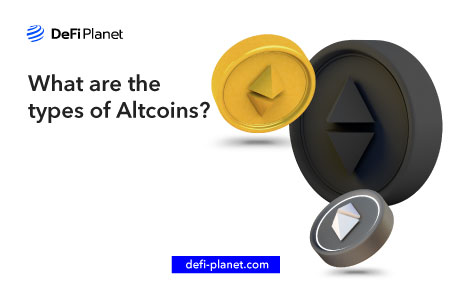As the crypto space expands, new cryptocurrencies emerge. Some are intended to serve as the keys to decentralized finance (DeFi) platforms. Some cryptocurrencies’ use cases are linked to NFT platforms and their functionalities. In some situations, a coin may include a stable feature that allows it to be pegged to a fiat currency. Whatever the case, many of these coins are classified as altcoins.
This article examines the meaning of altcoins and their various types. If you are a crypto enthusiast, there is a good chance you have interacted with altcoins.
What is an Altcoin?
Alternative coins (altcoins) are coins that exist but are not Bitcoin. For a long time, the term has been used to refer to any cryptocurrency that is not Bitcoin. Ethereum is sometimes regarded as an altcoin, and sometimes it is not.
Most cryptocurrencies were created to compete with Bitcoin or Ethereum. Ethereum 1.0, as a blockchain, employs the Proof-of-Work consensus mechanism, which is plagued with scalability difficulties. On Ethereum, the cost of minting an NFT is high. Crypto trading and DeFi activities also incur high gas fees. This is due to increased chain usage and the vast number of activities that occur in real-time.
Ethereum has been unable to scale with the increased activity on the blockchain. However, this is expected to change with Ethereum 2.0, which will use an ecologically friendly consensus mechanism, Proof-of-Stake, and additional sharding functionalities to improve scalability.
Altcoins that are native coins of blockchains were created as part of an ecosystem trying to solve the issues observed in Ethereum.
Types of Altcoins
There are different types of Altcoins and most of them tend to have use cases that they intend to achieve. Below are some of the types of Altcoins.
• Utility tokens
Utility tokens are native tokens of platforms that are designed to be used inside the ecosystem. A decentralized finance platform may come with a utility token that will be used by holders to carry out the different DeFi activities that are available in the protocol. If a decentralized lending platform has a utility token, it may charge users fees that are denominated in the token as transaction fees.
Let’s say an NFT marketplace has a utility token, it may charge the user its different fees in the native token of the platform. Utility tokens act as the key to different platforms.
Some utility tokens do not confer governance rights to the holders, meaning that holding the token does not mean that one can vote or decide what happens on the platform. It also does not mean that they own the platform or can earn dividends from holding it.
As always, it is important to find out the perks attached to holding a utility token from the organization or protocol issuing it.
An example is AXS token in the Axie Infinity play to earn gaming ecosystem.
• Stablecoins
Stablecoins are another type of altcoin. The cryptocurrency market is highly volatile, with token prices constantly fluctuating. This created a demand for cryptocurrencies unaffected by market conditions, implying that their value remains constant.
Stablecoins are a type of cryptocurrency that is pegged to a fiat currency. A stablecoin can be pegged to the value of the US dollar, the Australian Dollar, the British pound, the Japanese yen, and so on.
Traders hold stablecoins for different reasons. However, the most popular one is the USDT, which is pegged against several other cryptocurrencies on many crypto exchanges. Stablecoins allow crypto enthusiasts to enjoy the anonymity, flexibility, and other features that cryptocurrencies offer without worrying about volatility. There are different types of stablecoins such as Tether USD or USDT, Circle Stable coin or USDC, Binance stablecoin or BUSD, and so on.
A trader may hold a stablecoin like USDT so that they can purchase different types of tokens on crypto exchanges. With a stablecoin, it is easy to buy any token.
Traders may hold a stablecoin as a way of stabilizing their crypto portfolio. Stablecoins have a constant value, meaning crypto users can use them to hedge their crypto portfolio’s risk. Some traders may hold the stablecoin because they want to buy coins during a dip or a bear market.
Stablecoin is one type of altcoin in that the value does not increase, regardless of if the market is bullish and other coins are experiencing an astronomical rise in value.
It is important to note that the value of a stablecoin may be linked to the platform that issued it. Stablecoins linked to a reputable issuing authority may have better utility than others. If the issuing authority faces an issue, the value attached to the stablecoin may plunge.
Stablecoins may be decentralized or centralized. For instance, Tether USD or USDT is a centralized stablecoin, meaning that Tether has the power to freeze the accounts of USDT holders if they violate the terms of usage. Tether has done this in the past; an example happened in 2022.
According to reports, “Centralized Finance (CeFi) organization and leading USD stablecoin issuer, Tether, has frozen the funds linked to three Ethereum addresses with a value of over $150 million worth of USDT stablecoin. These addresses were among the first in 2022 that Tether added to the blacklist. Tether has been known to blacklist addresses that it believes belong to criminals of different types. Discretion as to which address to freeze lies at the company’s discretion.
Last year, Tether blacklisted 312 addresses, and since it began this process in 2017, it has frozen over five hundred addresses. The company is yet to release an announcement or Press Release concerning the reason behind the recent blacklisting. Precedence has shown that the incident may have occurred to freeze the addresses of those involved in cyber attacks.”
An example of a decentralized stablecoin is TerraUSD.
• Security Token
The security token is another type of altcoin. This type of token is similar to the traditional securities or stocks sold by publicly traded companies—the issuing protocol or platform awards individuals who purchase security tokens a percentage of ownership.
Holding security tokens grants users the same rights as stockholders.
Because of the tokens they hold, individuals may vote in elections and contribute to decision-making on the issuing protocol or platform. Those in charge of the protocol and its architecture are responsible for informing token holders about what is going on on the platform.
The requirements for issuing a security token are more stringent.
Security token holders are entitled to dividends paid by the protocol that issued them.
Security tokens are regarded as financial securities and are usually overseen by a country’s financial regulator.
For example, before issuing a security token in the United States, the Securities and Exchange Commission (SEC) requires the issuer to obtain the requisite license and approval. This is usually a rigorous procedure.
• Memecoins
This is another type of altcoin, generally intended as a joke. Memecoins tend to have a large number of coins in circulation and lack the relative scarcity that other types of tokens have. Typically, memecoins are not designed to have any value or utility. They are comic coins.
• Governance Tokens
Governance tokens grant holders access to governance rights in the ecosystem. Users can vote on prospective changes by holding the token, and the strength of their vote is determined by the number of tokens they own.
Holding the governance token also entitles users to submit proposals for prospective platform updates. This type of altcoin is intended to promote decentralization and incorporate democracy into operations in the crypto space. Utility tokens sometimes act as the governance coin on some platforms.
• Mining coins
Mining coins are types of altcoins that are Proof-of-Work tokens. Mining coins are the native tokens of platforms that utilize the PoW consensus mechanism. Litecoin is an example.
In Conclusion,
- Altcoins are alternative coins to Bitcoin and sometimes Ether.
- Some altcoins are utility tokens, native tokens of platforms designed to be used within an ecosystem.
- Stablecoins are altcoins that are pegged to a fiat currency.
- Security tokens are similar to traditional securities or stocks sold by publicly traded companies.
- Memecoins have no utility or value and are generally intended as a joke.
- Mining coins are the native tokens of platforms that utilize the PoW consensus mechanism.
- Altcoins also may be governance tokens used in voting and other governance activities.
If you would like to read more articles like this, visit DeFi Planet and follow us on Twitter, LinkedIn, Facebook, and Instagram.
“Take control of your crypto portfolio with MARKETS PRO, DeFi Planet’s suite of analytics tools”























